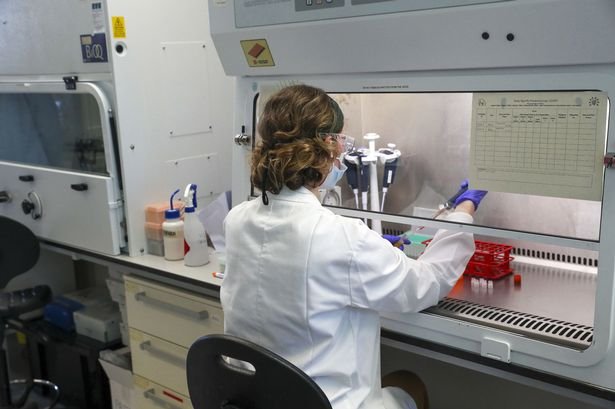
Scientists at the Universities of Bath and Edinburgh have published a new study indicating that the mutation rate of Covid-19 is “at least 50% higher than previously thought”.
The report says the virus that causes Covid-19 mutates almost once a week, which is significantly higher than the rate previously estimated.
This means that the results indicated that new variants may emerge faster than initially thought.
READ MORE: Hundreds of new student rooms and apartments in Bath get green light
The University of Bath says the findings, published in Genome Biology and Evolution, reinforce the need to isolate individuals whose immune systems struggle to contain the virus.
They said: “It was previously thought that SARS-CoV-2, the virus that causes Covid19, would mutate about once every two weeks. However, new research from the Milner Center for Evolution at the University of Bath and the MRC Human Genetics Unit at Edinburgh University, shows that this estimate overlooked many mutations that occurred but were never sequenced.
“Viruses mutate regularly, for example when mistakes are made by copying genomes while the virus is replicating.
“Usually when we look at natural selection we think of new mutations that have an advantage and thus spread, like the Alpha and Delta variants of Covid19. This is called Darwinian selection or positive selection.
“However, most mutations are harmful to the virus and reduce its chances of survival – this is called purifying or negative selection.
“These negative mutations do not survive long enough in the patient to be sequenced and are therefore absent from the mutation rate calculations.
“Taking these missing mutations into account, the team estimates that the virus’s true mutation rate is at least 50% higher than previously thought.”
Get today’s best stories and entertainment for free straight to your inbox
About 40% of mutations in the SARS-CoV-2 virus reduce the ability of the virus to survive and are therefore not found in the sequencing of patient samples
Professor Laurence Hurst, from the Milner Center for Evolution at the University of Bath, said: “Our results mean that if a patient suffers from Covid19 for more than a few weeks, the virus could evolve, which could potentially lead to new variants.
“It is believed that the Alpha variant is the result of the evolution of the virus in an individual who has not been able to clear the infection.
“This is not all bad news as most people transmit and clear the virus before it mutates so much, which means the chances of progress in a patient are usually not that high.
“However, this new estimate of the mutation rate indicates that there is more scope for the virus to evolve within these individuals than we might expect.”
The University of Bath also said that “the team could also determine why these mutations were missing.”
Professor Hurst said: “With the large number of SARS-CoV-2 genomes now sequenced, we can say something about both the number and the reason for the absence of these mutations, despite the fact that we do not cannot study them completely directly.
“During World War II, the Americans lost a lot of planes over Germany. They wanted to determine where they needed to add bulletproof material. surviving planes were the most vulnerable – gunfire at these locations caused the plane to crash and therefore not be seen on returning planes.
“We can use the same kind of trick to determine the profile of the missing mutations in SARS-CoV-2: the sequenced genomes are the returning planes. We can determine both the proportion of all planes that return when shot down and why some do not return. ”
“Much of the negative selection they found was for predictable reasons: mutations shorten genes or cause proteins, like the tip, to malfunction. Other mutations, however, were a surprise.” Addition of the University.
Want to be inspired? Our new Grace newsletter features the news each week through a female lens and shares the most inspiring stories about women from across the UK. register here
Lead author Dr Atahualpa Castillo Morales said: “The proteins produced by the virus are made up of amino acids. Like our genes, the genes of the virus have the instructions as to which amino acids to stick together and in what order.
“Oddly enough, we found that selection favored mutations that used more stable amino acids, meaning they didn’t need to be made that often and didn’t cost as much energy to maintain. supplies.
“We think we are seeing this because the virus is under strong selective pressure to replicate quickly and therefore the use of amino acids with a longer shelf life means you are less likely to have to wait for stationery.”
The study was funded by the Wellcome Trust and the European Research Council and is published in the journal Genome Biology and Evolution.
Want our best stories with fewer announcements and alerts when the biggest news falls? Download our app on iPhone or Android
Read more related articles Read more related articles
More about this article: Read More
Source: www.somersetlive.co.uk
This notice was published: 2021-08-25 17:33:26
